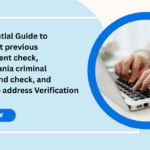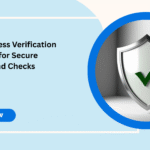In today’s fast-paced business world, protecting your organization from fraud and misconduct is more important than ever. One of the most effective ways to safeguard your company is through criminal record verification, a process that ensures potential employees, vendors, or partners have a clean and trustworthy background. By verifying criminal records before hiring or collaboration, businesses can significantly reduce the risk of fraud, theft, workplace violence, and reputational damage.
Fraudulent activity doesn’t just cause financial loss—it can also erode employee morale, disrupt operations, and damage customer trust. A single bad hire or unchecked association can put years of hard work at risk. Criminal record verification acts as a powerful preventive measure, giving employers confidence in their hiring decisions and helping them comply with industry regulations.
For small and large businesses alike, the stakes are high. Whether you’re hiring frontline staff, senior executives, or engaging contractors, criminal record checks provide peace of mind that you’re working with honest, reliable individuals. In an era where trust and credibility are crucial, investing in thorough background verification is not just about risk management—it’s about building a secure and sustainable future for your business.
Table of Contents
Why Businesses Need Criminal Record Verification
Hiring and partnerships are crucial for the growth of any organization. However, without proper verification, businesses risk exposing themselves to fraud, financial loss, and reputational harm. Criminal record verification is one of the most reliable ways to safeguard against these risks. Below are the key reasons businesses should prioritize this process.
Step 1 — Preventing Fraud and Financial Loss
Fraudulent activities such as embezzlement, theft, and identity fraud can severely harm a company. When employees or vendors with a history of dishonesty gain access to sensitive financial information or company assets, the consequences can be devastating. Conducting a criminal record check helps filter out individuals with a known history of fraudulent behavior, ensuring the business is better protected against such threats.
Step 2 — Ensuring Workplace Safety and Trust
Employee and customer safety is a top priority for any organization. Hiring someone with a violent criminal background can endanger the workplace environment, leading to accidents, conflicts, or legal liabilities. Criminal record verification allows employers to identify and avoid potential risks, fostering a safer, more trustworthy workplace culture. This is particularly important for industries like healthcare, education, and finance, where trust and safety are non-negotiable.
Step 3 — Protecting Company Reputation
A company’s reputation is one of its most valuable assets. One incident involving an employee with a hidden criminal past can quickly tarnish years of credibility. Clients, stakeholders, and partners expect businesses to exercise due diligence in their hiring and onboarding processes. Criminal record checks demonstrate a company’s commitment to integrity and responsibility, which builds confidence among customers and partners.
Step 4 — Compliance with Legal and Industry Standards
In many industries, background checks are not just recommended—they are legally required. For example, sectors like finance, IT, transportation, and childcare must adhere to strict compliance regulations. Failing to conduct criminal record verification can result in heavy fines, lawsuits, or loss of business licenses. By integrating verification into the hiring process, companies ensure compliance with regulations and safeguard themselves from legal consequences.
Step 5 — Reducing Employee Turnover Costs
Bad hires are expensive. Beyond recruitment expenses, businesses face training costs, loss of productivity, and potential legal fees when they must terminate employees due to undisclosed criminal histories. Criminal record verification reduces the chances of hiring the wrong candidate, saving businesses both time and money in the long run.
Step 6 — Building Long-Term Trust with Clients and Partners
Clients and business partners prefer to engage with companies that take security and integrity seriously. By ensuring employees and vendors are thoroughly vetted, businesses project professionalism and reliability. Criminal record checks help establish long-term relationships with stakeholders who value transparency and accountability.
Step 7 — Gaining Peace of Mind in Decision-Making
Ultimately, criminal record verification gives business owners and HR teams peace of mind. Knowing that every person hired or onboarded has been thoroughly checked provides confidence in daily operations. Instead of worrying about potential risks, leaders can focus on growth and innovation.
The Verification Process: Step by Step
Step 1 — Define scope & obtain consent
Before any search begins, the hiring team defines the scope: local criminal records, national court databases, police records, global watchlists, or a combination. Obtain written consent from the candidate (digital or paper) that explains what will be checked, why, and how results will be used. Consent protects you legally and preserves transparency.
Step 2 — Verify identity
Match the candidate’s identity details precisely before searching. Collect and confirm full name, date of birth, aliases, current and previous addresses, and government IDs. Identity verification reduces false positives and ensures searches target the correct records.
Step 3 — Select data sources
Choose authoritative sources based on scope and jurisdiction: court dockets, police records, national criminal registries, sex offender registries, watchlists (sanctions/PEP), and third-party commercial databases. For international hires, include relevant foreign government or embassy records where available.
Step 4 — Execute automated searches
Run automated queries against electronic databases and commercial aggregators to surface potential matches quickly. Automation speeds the process and returns initial hits that require human review. Typical automated checks return results within hours to a few days depending on source access.
Step 5 — Conduct manual record checks
For jurisdictions without reliable electronic databases, verification requires manual searches at courts, police stations, or government repositories. Trained investigators or local partners obtain official certified documents or court extracts. Manual checks are slower but necessary for thoroughness.
Step 6 — Validate and corroborate hits
Any “hit” (potential match) must be corroborated using multiple data points: matching name, DOB, place of birth, case number, or address. Check original source documents (court orders, charge sheets, judgments) rather than relying solely on aggregated summaries to avoid false positives.
Step 7 — Assess relevance & severity
Not every record is equally material. Classify findings by relevance to the role: direct (violent crime, fraud) vs. peripheral (minor traffic offenses). Consider recency, jurisdiction, conviction vs. arrest, and legal disposition (convicted, acquitted, sealed). Some industries require zero tolerance for certain offenses.
Step 8 — Conduct contextual review
A human analyst assesses the context—time elapsed since the offense, rehabilitation evidence, and any legal nuances (expungement, pardons). This prevents unfair exclusion based on stale or irrelevant records.
Step 9 — Adjudication & decision framework
Use a documented adjudication policy that defines how different findings influence hiring decisions. Apply the policy consistently and allow for case-by-case discretion. Document reasons for adverse decisions in case of disputes.
Step 10 — Communicate results & allow candidate response
If adverse information is found, provide the candidate with a copy of the findings and an opportunity to explain or correct errors (pre-adverse and adverse action process). This is both fair practice and a legal safeguard in many jurisdictions.
Step 11 — Report generation
Produce a clear report summarizing sources checked, findings, evidence copies, relevance assessment, and recommendations. Use clear status labels (No Record Found; Match — Verified; Match — Unverified; Pending).
Step 12 — Retention, privacy & compliance
Store verification data securely and only as long as legally permitted. Comply with data-protection laws (e.g., purpose limitation, access controls, encryption). Keep an audit trail of searches, consent, and communications.
Step 13 — Ongoing monitoring & rechecks
For high-risk roles, set up periodic rechecks or continuous monitoring for new criminal records or sanctions. Regular revalidation helps maintain a safe workplace over time.
Benefits of Criminal Record Verification
Criminal record verification is one of the most reliable tools for businesses to ensure they are hiring or engaging with trustworthy individuals. Beyond compliance, it safeguards an organization’s reputation, minimizes risks, and promotes a culture of security. Let’s explore the key benefits step by step:
1. Enhanced Workplace Safety
One of the most significant advantages of conducting criminal record verification is the creation of a safe work environment. By screening candidates, businesses can identify individuals with histories of violent crimes, theft, or fraudulent activity. This reduces the likelihood of workplace conflicts, misconduct, or harm to other employees and customers. A secure workplace also increases employee confidence and productivity.
2. Protecting Company Reputation
Reputation is one of the most valuable assets for any business. Hiring someone with a questionable background can damage trust with clients, partners, and stakeholders. A single incident involving an employee with a criminal history could lead to negative publicity and a long-term loss of credibility. Criminal record checks act as a preventive measure, ensuring that organizations are represented by individuals who align with their values and standards.
3. Minimizing Financial Losses
Fraud, theft, and embezzlement are among the biggest risks businesses face. Criminal record verification helps mitigate these risks by highlighting candidates with past convictions related to financial misconduct. This prevents hiring individuals who may pose a threat to company assets. In industries like finance, retail, or logistics, where financial integrity is critical, this benefit becomes even more valuable.
4. Regulatory Compliance
In many industries, background checks are not optional but mandatory. For example, sectors such as banking, healthcare, education, and security require strict employee screening as part of compliance with government regulations. Conducting criminal record verification ensures that businesses meet these legal obligations, avoiding potential penalties, lawsuits, or license revocations.
5. Improved Hiring Decisions
A thorough criminal record verification provides hiring managers with deeper insights into a candidate’s history. While qualifications and experience are essential, character and trustworthiness are equally important. With this information, businesses can make informed hiring decisions, balancing skills with integrity. It reduces the chances of “bad hires” and lowers employee turnover rates.
6. Increased Customer Trust
For businesses that interact directly with clients, such as delivery services, caregiving, or financial institutions, trust is critical. Customers are more likely to engage with companies that prioritize safety and reliability. By conducting criminal record checks, businesses can demonstrate their commitment to protecting clients, thereby building stronger customer relationships and brand loyalty.
7. Deterrence Against Misconduct
Knowing that a company follows a strict criminal verification process can deter potential candidates with questionable backgrounds from applying. This automatically filters out unsuitable applicants and saves HR departments time and resources. It also sends a strong message that the organization upholds high ethical and professional standards.
8. Long-Term Business Growth
Ultimately, businesses that invest in criminal record verification set a foundation for long-term success. Reduced risks, improved workplace culture, and enhanced trust contribute to sustainable growth. Employees feel safer, customers feel valued, and stakeholders view the company as reliable and responsible.
How Screenaze Helps Businesses Stay Protected
In today’s fast-paced business world, the risks of fraud, misconduct, and compliance failures are higher than ever. Companies must take proactive measures to safeguard their people, assets, and reputation. Screenaze, with its advanced background verification services, plays a crucial role in helping businesses stay protected. From criminal record verification to detailed checks tailored to industry needs, Screenaze provides comprehensive solutions. Let’s explore step by step how Screenaze ensures security and peace of mind for organizations.
1. Comprehensive Criminal Record Checks
Screenaze specializes in criminal record verification that allows businesses to identify any history of fraudulent, violent, or illegal behavior. By accessing reliable databases and working with legal partners, Screenaze provides accurate and up-to-date reports. This prevents companies from unknowingly hiring individuals who could pose risks to workplace safety or financial integrity.
2. Ensuring Compliance Across Industries
Different industries have specific regulatory requirements. For instance, healthcare, education, and finance sectors require rigorous employee screening. Screenaze ensures that businesses meet these standards by conducting tailored verification processes that align with legal guidelines. By staying compliant, organizations avoid penalties, lawsuits, and damage to their credibility.
3. Reducing Hiring Risks
A wrong hire can cost a business both financially and operationally. Screenaze helps minimize this risk by providing detailed insights into candidates’ past behaviors. Beyond criminal checks, the service includes identity validation, education verification, and employment history confirmation. This holistic approach ensures that companies make informed decisions when onboarding new employees.
4. Protecting Company Reputation
Reputation is an intangible but powerful business asset. Even one incident of misconduct can lead to negative publicity and loss of trust. Screenaze protects businesses by screening out high-risk individuals before they can enter the organization. This proactive step not only safeguards reputation but also builds trust among customers, partners, and stakeholders.
5. Building Safer Work Environments
Employee safety is a top priority for every organization. By using Screenaze, businesses can reduce the chances of hiring individuals with violent or harmful histories. This creates a more secure environment where employees feel confident and motivated to perform their best. A safe workplace also contributes to stronger team culture and lower turnover rates.
6. Preventing Financial Fraud and Losses
Financial crimes like theft and embezzlement can devastate a company’s stability. Screenaze’s verification process highlights any red flags in a candidate’s past, especially in roles involving money management or sensitive data. By filtering out individuals with suspicious records, businesses reduce the risk of financial loss and fraud.
7. Boosting Customer Trust
Clients are more likely to trust companies that demonstrate responsibility and care. When businesses partner with Screenaze for background checks, they showcase their commitment to transparency and safety. This builds stronger customer relationships and enhances long-term loyalty.
8. Streamlined Digital Verification
Screenaze leverages modern technology to make the verification process fast and efficient. With digital submissions, secure data handling, and transparent reporting, businesses can access results quickly without compromising accuracy. This ensures smoother hiring processes and faster onboarding.
Conclusion
Criminal record verification is no longer an optional step for businesses—it is a critical safeguard against fraud, misconduct, and reputational damage. By thoroughly screening candidates and employees, companies can reduce hiring risks, comply with industry regulations, and create a safe, trustworthy work environment. Beyond protecting assets, criminal record checks also strengthen customer and partner confidence, proving that the organization values integrity and security.
Screenaze makes this process seamless by combining accuracy, compliance, and efficiency in every verification. With its step-by-step approach and tailored solutions, businesses gain a reliable shield against potential threats. In an era where even one wrong hire can cause lasting consequences, proactive verification becomes the best defense. By partnering with Screenaze, organizations not only protect themselves from fraud but also lay the foundation for sustainable growth built on safety, trust, and accountability.





